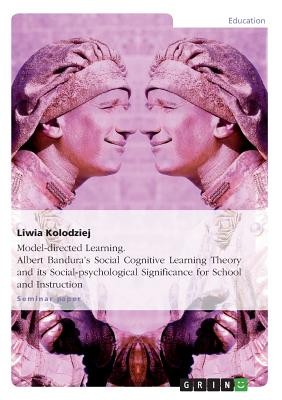
- We will send in 10–14 business days.
- Author: Liwia Kolodziej
- Publisher: Grin Verlag Gmbh
- ISBN-10: 3656881294
- ISBN-13: 9783656881292
- Format: 14.8 x 21 x 0.2 cm, minkšti viršeliai
- Language: English
- SAVE -10% with code: EXTRA
Model-directed Learning. Albert Bandura's Social Cognitive Learning Theory and its Social-psychological Significance for School and Instruction (e-book) (used book) | bookbook.eu
Reviews
Description
Seminar paper from the year 2006 in the subject Pedagogy - Science, Theory, Anthropology, grade: 1,7, University of Wuppertal, course: Theory of Learning, language: English, abstract: This term paper explores the subject "Model-directed Learning, Albert Bandura's Social Cognitive Learning Theory and its social-psychological Significance for School and Instruction". The topic touches on several complex scientific areas that cannot be exhaustively discussed and in part can only contribute in a more generalized form to the scope of this term paper. Hence, there is the challenge of setting boundaries at first. The main focus of this paper is on the social cognitive learning theory according to Albert Bandura, with its central statements serving as the theoretical foundation of the paper as a whole. The aim is to investigate, which basic principles Bandura is adopting from human behavior, how he does explain and analyze this approach. This theoretical rationale should be set up in the socio-psychological context of school and instruction. Hence, a main goal of this paper is to establish a theory-practice relevance. In other words, the focus is to investigate which consequences are arising from the social cognitive learning theory for school, teaching, education, and studying. A key aspect of the social cognitive learning theory is model-based learning, thus, the assumption that human learning can happen through observation and imitation of others. In a society, in which humans strive for individuality and originality, imitation and simulation are associated with negative characteristics. Nevertheless, imitation behavior plays an important role even in every day situations. A person's aggressive behavior or drug habit is often rationalized with the assumption that this behavior was copied from friends, or was due to the influence of others, or being surrounded with the wrong people. This term paper attempts to show the scientific reasoning behind this "everyday wisdom",
EXTRA 10 % discount with code: EXTRA
The promotion ends in 21d.06:56:13
The discount code is valid when purchasing from 10 €. Discounts do not stack.
- Author: Liwia Kolodziej
- Publisher: Grin Verlag Gmbh
- ISBN-10: 3656881294
- ISBN-13: 9783656881292
- Format: 14.8 x 21 x 0.2 cm, minkšti viršeliai
- Language: English English
Seminar paper from the year 2006 in the subject Pedagogy - Science, Theory, Anthropology, grade: 1,7, University of Wuppertal, course: Theory of Learning, language: English, abstract: This term paper explores the subject "Model-directed Learning, Albert Bandura's Social Cognitive Learning Theory and its social-psychological Significance for School and Instruction". The topic touches on several complex scientific areas that cannot be exhaustively discussed and in part can only contribute in a more generalized form to the scope of this term paper. Hence, there is the challenge of setting boundaries at first. The main focus of this paper is on the social cognitive learning theory according to Albert Bandura, with its central statements serving as the theoretical foundation of the paper as a whole. The aim is to investigate, which basic principles Bandura is adopting from human behavior, how he does explain and analyze this approach. This theoretical rationale should be set up in the socio-psychological context of school and instruction. Hence, a main goal of this paper is to establish a theory-practice relevance. In other words, the focus is to investigate which consequences are arising from the social cognitive learning theory for school, teaching, education, and studying. A key aspect of the social cognitive learning theory is model-based learning, thus, the assumption that human learning can happen through observation and imitation of others. In a society, in which humans strive for individuality and originality, imitation and simulation are associated with negative characteristics. Nevertheless, imitation behavior plays an important role even in every day situations. A person's aggressive behavior or drug habit is often rationalized with the assumption that this behavior was copied from friends, or was due to the influence of others, or being surrounded with the wrong people. This term paper attempts to show the scientific reasoning behind this "everyday wisdom",


Reviews